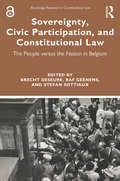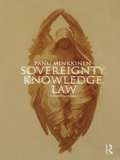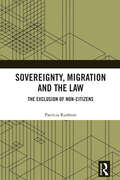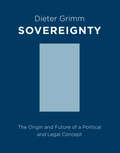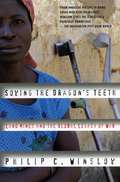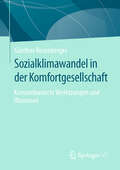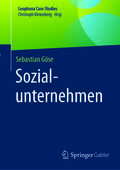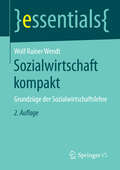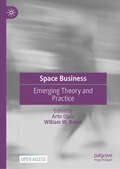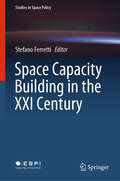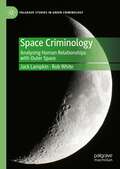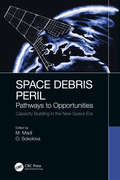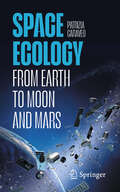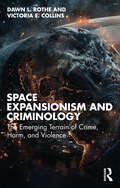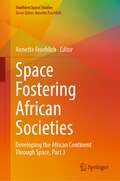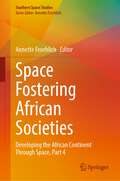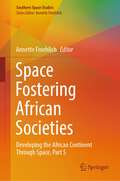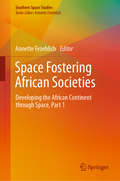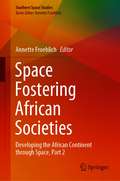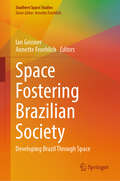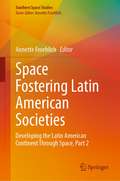- Table View
- List View
Sovereignty, Civic Participation, and Constitutional Law: The People versus the Nation in Belgium (Routledge Research in Constitutional Law)
by Brecht Deseure, Raf Geenens, and Stefan SottiauxThis book brings recent insights about sovereignty and citizen participation in the Belgian Constitution to scholars in the fields of law, philosophy, history, and politics. Throughout the Western world, there are increasing calls for greater citizen participation. Referendums, citizen councils, and other forms of direct democracy are considered necessary antidotes to a growing hostility towards traditional party politics. This book focuses on the Belgian debate, where the introduction of participatory politics has stalled because of an ambiguity in the Constitution. Scholars and judges generally claim that the Belgian Constitution gives ultimate power to the nation, which can only speak through representation in parliament. In light of this, direct democracy would be an unconstitutional power grab by the current generation of citizens. This book critically investigates this received interpretation of the Constitution and, by reaching back to the debates among Belgium’s 1831 founding fathers, concludes that it is untenable. The spirit, if not the text, of the Belgian Constitution allows for more popular participation than present-day jurisprudence admits. This book is the first to make recent debates in this field accessible to international scholars. It provides a rare source of information on Belgium’s 1831 Constitution, which was in its time seen as modern constitutionalism’s greatest triumph and which became a model for countless other constitutions. Yet the questions it asks reverberate far beyond Belgium. Combining new insights from law, philosophy, history, and politics, this book is a showcase for continental constitutional theory. It will be a valuable resource for academics and researchers in constitutional law, political and legal philosophy, and legal history.
Sovereignty, Knowledge, Law
by Panu MinkkinenSovereignty, Knowledge, Law investigates the notion of sovereignty from three different, but related perspectives: as a legal question in relation to the sovereign state, as a political question in relation to sovereign power, and as a metaphysical question in relation to sovereign self-knowledge. The varied and interchangeable uses of legal sovereignty, political sovereignty and metaphysical sovereignty in contemporary debates have resulted in a situation where the word ‘sovereignty’ itself has become something of a non-concept. Panu Minkkinen shows here how these three perspectives have informed one another, by addressing their shared relationship to law, and to the ‘autocephalous’ function of sovereignty; that is, the attempt to provide a single source and foundation for law, power, and self-knowledge. Through an effort to domesticate the intrinsically ‘heterocephalous’ nature of power, the juridical and jurisprudential aim has been to confine power within the closed vertical hierarchy of traditional legal thinking. Sovereignty, Knowledge, Law thus elaborates this heterocephaly, proposing new understandings of sovereignty, as well as of law and of legal scholarship.
Sovereignty, Migration and the Law: The Exclusion of Non-Citizens
by Patricia RushtonThis book examines how states justify the creation of physical, policy and legislative barriers of entry for migrants by drawing on a concept of sovereignty.The movement of people across the world in search of refuge from persecution, war and poverty is accelerating. And as states confronted with this movement create physical, policy and legislative barriers to entry, they justify this exclusion by drawing on concepts of sovereignty. This book interrogates that justification in an historical and theoretical context using the case study of Australian law and policy since 1900, as well as instances from other Western countries that have routinely copied from Australia. But just as Australian migration polices are being replicated in the US, Britain and Europe, so, this book argues, is their employment of an anachronistic concept of sovereignty: one that is reasserted precisely because of its waning power in the face of globalisation.This book will be an important resource for law and political science scholars, researchers and students in the fields of migration and refugee law and policy, as well as to professional policy makers, government institutions, lawyers and international agencies with a particular focus on those fields.
Sovereignty, Statehood and State Responsibility
by Freya Baetens Christine ChinkinThis collection of essays focusses on the following concepts: sovereignty (the unique, intangible and yet essential characteristic of states), statehood (what it means to be a state, and the process of acquiring or losing statehood) and state responsibility (the legal component of what being a state entails). The unifying theme is that they have always been and will in the future continue to form a crucial part of the foundations of public international law. While many publications focus on new actors in international law such as international organisations, individuals, companies, NGOs and even humanity as a whole, this book offers a timely, thought-provoking and innovative reappraisal of the core actors on the international stage: states. It includes reflections on the interactions between states and non-state actors and on how increasing participation by and recognition of the latter within international law has impacted upon the role and attributes of statehood.
Sovereignty, property and empire, 1500-2000
by Andrew FitzmauriceThis book analyses the laws that shaped modern European empires from medieval times to the twentieth century. Its geographical scope is global, including the Americas, Europe, Africa, Asia, Australia and the Poles. Andrew Fitzmaurice focuses upon the use of the law of occupation to justify and critique the appropriation of territory. He examines both discussions of occupation by theologians, philosophers and jurists, as well as its application by colonial publicists and settlers themselves. Beginning with the medieval revival of Roman law, this study reveals the evolution of arguments concerning the right to occupy through the School of Salamanca, the foundation of American colonies, seventeenth-century natural law theories, Enlightenment philosophers, eighteenth-century American colonies and the new American republic, writings of nineteenth-century jurists, debates over the carve up of Africa, twentieth-century discussions of the status of Polar territories, and the period of decolonisation.
Sovereignty: The Origin and Future of a Political and Legal Concept (Columbia Studies in Political Thought / Political History)
by Dieter GrimmDieter Grimm's accessible introduction to the concept of sovereignty ties the evolution of the idea to historical events, from the religious conflicts of sixteenth-century Europe to today's trends in globalization and transnational institutions. Grimm wonders whether recent political changes have undermined notions of national sovereignty, comparing manifestations of the concept in different parts of the world. Geared for classroom use, the study maps various notions of sovereignty in relation to the people, the nation, the state, and the federation, distinguishing between internal and external types of sovereignty. Grimm's book will appeal to political theorists and cultural-studies scholars and to readers interested in the role of charisma, power, originality, and individuality in political rule.
Sowing the Dragon's Teeth: Land Mines and the Global Legacy of War
by Philip C. Winslow[Back Cover[] Each year an estimated twenty-six thousand people are killed or maimed by land mines-- more than 100 million of them sown like the mythical dragon's teeth in over seventy countries. These weapons are designed to maim soldiers, but most victims are civilians, especially the rural poor. Winslow writes about these people and the Campaign to Ban Landmines (which was awarded The Nobel Peace Prize in 1997). He tells about the efforts to pull the dragon's teeth from the earth so that it can be restored to those who live on it. Philip Winslow transports readers to the villages of eastern Angola to witness the daily havoc wreaked by land mines in a country struggling to keep a fragile peace. . .. Sowing the Dragon's Teeth makes a strong case that a ban [on land mines]--championed by the late Princess Diana--is a necessity.
Soziale Netzwerke – Die Familie von heute: Recht und Politik der Regulierung
by Vanessa KirchSoziale Netzwerke haben eine Fülle von Problemen in Bezug auf die Privatsphäre und den Schutz personenbezogener Daten aufgeworfen. Die Nutzung sozialer Netzwerke ist zu einem zentralen Anliegen von Rechtswissenschaftlern, politischen Entscheidungsträgern und den Betreibern sowie den Nutzern dieser sozialen Netzwerke geworden. Dieses bahnbrechende Buch beleuchtet die Bedeutung des Datenschutzes im Zusammenhang mit den neuen elektronischen Kommunikationstechnologien von heute, da es widersprüchliche Ansprüche zum Schutz der nationalen und internationalen Sicherheit, der Freiheit des Internets und wirtschaftlicher Überlegungen aufzeigt. Auf der Grundlage des intellektuellen Rahmens der New Haven School of Jurisprudence stellt der Autor das geltende Recht zum Schutz der Privatsphäre und zu sozialen Medien in internationaler und vergleichender Perspektive dar und konzentriert sich dabei auf die Vereinigten Staaten, die Europäische Union und ihre Allgemeine Datenschutzverordnung von 2018 sowie auf Deutschland, das Vereinigte Königreich und Lateinamerika. Das Buch bewertet das geltende Recht, erörtert Alternativen und gibt Empfehlungen für eine öffentliche Ordnung der Menschenwürde. Übersetzt mit www.DeepL.com/Translator (kostenlose Version)
Sozialklimawandel in der Komfortgesellschaft: Konsumbasierte Verletzungen und Illusionen
by Günther RosenbergerAnlass für dieses Buchs sind die zunehmende Kälte im Umgang der Bürger miteinander und ihre mangelnde Empathie: normenverletzendes Handeln zulasten der Mitmenschen, Hassausbrüche in sozialen Netzen, Übergriffigkeiten jeder Art. Oft wird vor einem Auseinanderfallen des gesellschaftlichen Zusammenhangs gewarnt, manche Protestformen gewinnen gar bürgerkriegsähnlichen Charakter. Welche Rolle spielen dabei hedonistischer Konsum, Identitätszweifel, die Suche nach Selbstwert und eskapistisches Verhalten? Wo die Ursachen dieses Sozialklimawandels zu suchen sind, untersucht das Buch anhand zeittypischen Verhaltens.
Sozialunternehmen
by Sebastian GöseDas Buch unterstützt Unternehmen bei der Integration von Menschen mit Behinderung in den 1. Arbeitsmarkt. So versucht die Case Study ein Grundverständnis dafür zu schaffen, welche Herausforderungen das Management von Sozialunternehmen beinhaltet. Dazu werden insbesondere Themen aus der Personalführung, dem Personalmanagement, der Unternehmenskultur sowie die besonderen Bedürfnisse von Menschen mit Handicap analysiert. Darüber hinaus wird erarbeitet, was ein „Social Business“ von „Social Entrepreneurship“ oder „Social Enterprise“ unterscheidet. Außerdem wird das Social Business mit Blick auf die direkte und indirekte Erfüllung gesellschaftlicher Bedürfnisse mit dem „Commercial Business“ verglichen. So wird herausgearbeitet, wie speziell Sozialunternehmen als neue Unternehmensform Menschen mit Handicap helfen und von diesen genutzt werden können. Die Case Study beschreibt, wie ein Businessplan von einem Unternehmen in der Sozialwirtschaft aussehen könnte. Darüber hinaus wird die spezielle Unternehmenskultur am Beispiel der AfB gGmbH diskutiert und wie sich diese von der herkömmlicher Unternehmen unterscheidet. Des Weiteren werden die besonderen Herausforderungen bei der Akquise von Menschen mit Handicap und deren Integration in ein Unternehmen behandelt.So setzen sich die Bearbeiterinnen und Bearbeiter mit den Entwicklungsmöglichkeiten der AfB gGmbH auseinander und entwickeln ein nachhaltiges Konzept zur gewünschten Expansion des Unternehmens.Die Leuphana Case Studies sind ein Projekt, das in Zusammenarbeit mit kleinen und mittelständischen Unternehmen erstellt und entwickelt worden ist. Sie sind ein Lehrbuch, mit dessen Hilfe Unternehmen, die vor ähnlichen Herausforderungen stehen, selbige bewältigen können. Dafür ist keine Hilfe von Dritten notwendig. Auf Grundlage der einzelnen Case Studies werden den Bearbeiterinnen und Bearbeitern elementare Werkzeuge aus der wissenschaftlichen Theorie erklärt. Diese können sie anwenden, um mit den Insiderkenntnissen des eigenen Unternehmens Prozesse zu optimieren, Ziele entwickeln und erreichen oder schwierige Herausforderungen zu bewältigen.
Sozialwirtschaft kompakt: Grundzüge der Sozialwirtschaftslehre (essentials)
by Wolf Rainer WendtDieses essential enthält eine kurze und prägnante Darstellung der Theorie sozialen Wirtschaftens. Es erhellt den Handlungsbereich der personenbezogenen Wohlfahrtsproduktion im sozialen Versorgungssystem und im organisierten Zusammenwirken professioneller, frei engagierter und selbstbetroffener Akteure. In der Sozialwirtschaftslehre wird die Erbringung sozialer und gesundheitsbezogener Leistungen institutionell und funktional begriffen.
Soziologie der Würde: Eine Einführung in ihre Problemzugänge, Analysen und Befunde
by Friedrich W. StallbergDieses Studienbuch bietet eine soziologische Einführung in die konfliktreiche Welt der Menschenwürde. In Abgrenzung zum vorherrschenden normativen Verständnis von Würde wird diese als eine Achtung und Autonomie anstrebende individuelle Handlungsorientierung beschrieben, die interaktiv und institutionell geformt ist, und deren Erfolgschancen von den umfassenden gesellschaftlichen Verhältnissen abhängen. Da sich Würde im Alltag erst in Situationen der Bedrohtheit und Beschädigung als für Lebensführung und Identität unentbehrlich zu erkennen gibt, konzentriert sich auch die Darstellung ihrer Realität auf Risiken, Formen und zentrale Schauplätze ihrer Beeinträchtigung.
Space Business: Emerging Theory and Practice
by William W. Baber Arto OjalaThis book is an academic investigation of commercial activities of firms in the space related industries and those utilizing services provided by space technology firms. These firms and their activities are part of the “New Space” concept where space related commercial activities are undertaken and funded by private firms rather than government institutions. New Space is leading to business model innovation and new theory about space business activities including upstream and downstream commercial activities. Upstream value chains include activities prior to turnover of launched systems to operators. Downstream value chains include operation of systems in space as well as the transfer, processing, and sale of space-based data and data services. The commercial activities of space business now reach into everyday lives of most humans from banking and disaster management to resource monitoring to tourism. With such broad reach, the New Space ecosystem is rapidly developing in importance and complexity.
Space Capacity Building in the XXI Century (Studies in Space Policy #22)
by Stefano FerrettiThis book, edited by the European Space Policy Institute, is the first international publication, following UNISPACE+50, to analyze how space capacity building can empower the international community towards fully accessing all the economic and societal benefits that space assets and data can offer. New innovation models are increasingly spreading across various sectors and disciplines, including space, which is becoming an integral part of many societal activities (e.g. telecoms, weather, climate change and environmental monitoring, civil protection, infrastructures, transportation and navigation, healthcare and education). The book helps readers construct their own space capacity building roadmaps, which take into account key stakeholders and also new private actors, NGOs and civil society. Starting from a policy and strategy perspective, it addresses key aspects of capacity building, including innovation and exploration, global health, climate change and resilient societies. It outlines the available options and summarizes the ideal programmatic conditions for their successful implementation. Showcasing reflections from a range of senior space professionals around the world, with their unique perspectives and solutions, it provides a rich mosaic in which various cultural and policy approaches to space are translated into actionable programs and ideas so that space may truly benefit all of humankind.
Space Criminology: Analysing Human Relationships with Outer Space (Palgrave Studies in Green Criminology)
by Rob White Jack LampkinAs humans expand the frequency and scale of interactions off-planet, Space Criminology ponders the nature of crime, harm and transgression in outer space and possible responses to these. The first book of its kind, it discusses the dynamics of space crime, from those involving powerful elites through to those associated with the mundane interactions of people living and working in space. It is essential reading for anyone interested in extra-terrestrial crime, space law, and criminal justice.
Space Debris Peril: Pathways to Opportunities
by M. Madi and O. Sokolova"This book provides up-to-date knowledge of space debris and valuable insights on how to grapple with this issue from legal, technical, economical and societal aspects. I would strongly recommend that everyone who is working on space development and utilizations and even non-specialists once read this book and think over how human being should be faced with this issue." –Prof. Shinichi Nakasuka, University of Tokyo, Japan Space Debris Peril: Pathways to Opportunities takes readers through the wide spectrum of problems created by space debris – including technical, political, legal and socio-economical aspects – and suggests ways to mitigate its negative consequences and create new opportunities. With chapter contributions from authors at world-renowned universities, private or public entities, and research institutes active in the field of space debris mitigation, space policy and law, risk and resilience, liability and insurance, this book provides a comprehensive introduction to the subject helping the reader to grasp the whole picture of the current space debris remediation challenges. This book will be of interest to the scientific communities, policy makers, business developers, (re)insurers and international standards developers for space operations and orbital debris mitigation. Also, it should appeal to a broader audience among non-specialists in various sectors and the general public. Key features: Brings together interdisciplinary perspectives on the topic in one, cohesive book Chapter contributions from specialists in this interdisciplinary field from around the globe Up-to-date information with the latest developments
Space Ecology: From Earth to Moon and Mars
by Patrizia CaraveoThe recent entry of private entrepreneurs into the world of space has multiplied the number of services provided by instruments in orbit, resulting into a rapid and tumultuous growth of the space economy. More services translate into more launches bringing into orbit more satellites. As a result, circum-terrestrial orbits are filling up alarmingly, and we are only at the beginning of the proliferation of mega constellations that have sprung up in recent years to provide planet-wide Internet connectivity. There are neither national nor international laws for managing the number of orbiting satellites that are growing at such a dizzying rate that real orbital traffic jams are feared. We need to extend to the space around us, but also to the other bodies in the solar system, the concept of sustainable use so as not to repeat the same mistakes we have made on Earth's surface. Around our planet we need to avoid overcrowding of orbits so as not to endanger our planet's economy, which is heavily dependent on the use of satellites. Looking further afield, to the Moon and Mars, for example, we must balance resource utilization with unnecessary pollution of fragile ecosystems. Human settlements will have to respect the ecosystem of these celestial bodies that do not belong to any state but must be absolutely protected in order to prevent an interplanetary version of the tragedy of the commons, unfortunately so familiar in our planet. Particular attention must be paid to the risks of biological pollution. Explorers (both human and robotic) risk carrying terrestrial material. Similarly, handling extraterrestrial samples requires well-equipped laboratories and continuous surveillance.
Space Expansionism and Criminology: The Emerging Terrain of Crime, Harm, and Violence
by Dawn L. Rothe Victoria E. CollinsWe have entered a recent zeitgeist, the era of the "new space age", driven by billionaires, technological advancements, and a few dominating state powers. While the race to space may be said to offer "new" opportunities for "humanity", we ask, is it predicated on the same logics and historical patterns of the past? This question guides our approach and critical assessment of human expansionism into space. Space Expansionism and Criminology: The Emerging Terrain of Crime, Harm, and Violence offers readers a critical analysis of space expansionism and today’s race to space that has come to define our contemporary era. Taking a retrospective and prospective approach, we delve into the choices being made, the justifications being offered, and those excluded from the hegemonic discourse of the benefits of humans as extraplanetary beings. Space Expansionism and Criminology includes chapters on the historical roots of today’s space race, weaponization and realpolitik, space junk and debris, space mining and resource extrapolation, the burgeoning space tourism market, the manufacturing of space nostalgia from the 1950s through today, and efforts towards, and claims-making for, space colonization to save Earth and humanity.
Space Fostering African Societies: Developing the African Continent Through Space, Part 3 (Southern Space Studies)
by Annette FroehlichThis peer-reviewed book provides detailed insights into how space and its applications are, and can be used to support the development of the full range and diversity of African societies, as encapsulated in the African Union’s Agenda 2063. Following on from Part 1 and 2, which were highly acclaimed by the space community, it focuses on the role of space in supporting the UN Sustainable Development Goals in Africa, but covers an even more extensive array of relevant and timely topics addressing all facets of African development. It demonstrates that, while there have been significant achievements in recent years in terms of economic and social development, which have lifted many of Africa’s people out of poverty, there is still a great deal that needs to be done to fulfill the basic needs of Africa's citizens and afford them the dignity they deserve. To this end, space is already being employed in diverse fields of human endeavor to serve Africa’s goals for its future, but there is much room for further incorporation of space systems and data. Providing a comprehensive overview of the role space is playing in helping Africa achieve its developmental aspirations, the book will appeal to both students and professionals in fields such as space studies, international relations, governance, and social and rural development.
Space Fostering African Societies: Developing the African Continent Through Space, Part 4 (Southern Space Studies)
by Annette FroehlichThis peer-reviewed book provides detailed insights into how space and its applications are, and can be used to support the development of the full range and diversity of African societies, as encapsulated in the African Union’s Agenda 2063. Following on from Part 1 to Part 3, which was highly acclaimed by the space community, it focuses on the role of space in supporting the UN Sustainable Development Goals in Africa, but covers an even more extensive array of relevant and timely topics addressing all facets of African development. It demonstrates that, while there have been significant achievements in recent years in terms of economic and social development, which have lifted many of Africa’s people out of poverty, there is still a great deal that needs to be done to fulfill the basic needs of Africa's citizens and afford them the dignity they deserve. To this end, space is already being employed in diverse fields of human endeavor to serve Africa’s goals for its future, but there is much room for further incorporation of space systems and data. Providing a comprehensive overview of the role space is playing in helping Africa achieve its developmental aspirations, the book will appeal to both students and professionals in fields such as space studies, international relations, governance, social, rural and technical development.
Space Fostering African Societies: Developing the African Continent Through Space, Part 5 (Southern Space Studies)
by Annette FroehlichThis peer-reviewed book provides detailed insights into how space and its applications are, and can be used to support the development of the full range and diversity of African societies, as encapsulated in the African Union’s Agenda 2063. Following on from Part 1 to Part 4, which were highly acclaimed by the space community, it focuses on the role of space in supporting the UN Sustainable Development Goals in Africa, but covers an even more extensive array of relevant and timely topics addressing all facets of African development. It demonstrates that, while there have been significant achievements in recent years in terms of economic and social development, which have lifted many of Africa’s people out of poverty, there is still a great deal that needs to be done to fulfill the basic needs of Africa's citizens and afford them the dignity they deserve. To this end, space is already being employed in diverse fields of human endeavor to serve Africa’s goals for its future, but there is much room for further incorporation of space systems and data. Providing a comprehensive overview of the role space is playing in helping Africa achieve its developmental aspirations, the book will appeal to both students and professionals in fields such as space studies, international relations, governance, social, rural and technical development.
Space Fostering African Societies: Developing the African Continent through Space, Part 1 (Southern Space Studies)
by Annette FroehlichThis book provides detailed insights into how space and its applications are, and can be, used to support the development of the full range and diversity of African societies, as encapsulated in the African Union’s Agenda 2063. Like previous books in the "Southern Space Studies" series, it focuses on the role of space in supporting the UN Sustainable Development Goals in Africa, but it covers an even more extensive array of relevant and timely topics addressing all facets of African development. It demonstrates that, while great achievements have been made in recent years in terms of economic and social development, which has lifted many of Africa’s people out of poverty, there is still much that needs to be done to fulfill the basic needs of Africa's citizens and afford them the dignity they deserve: to this end space is already being employed in diverse fields of human endeavor to serve Africa’s goals for its future, but there is much room for further incorporation of space systems and data. Providing a comprehensive overview of the role space is playing in achieving Africa’s developmental aspirations, the book is of great interest to both students and professionals in fields such as space studies, international relations, governance, social and rural development, and many others.
Space Fostering African Societies: Developing the African Continent through Space, Part 2 (Southern Space Studies)
by Annette FroehlichThis peer-reviewed book provides detailed insights into how space and its applications are, and can be used to support the development of the full range and diversity of African societies, as encapsulated in the African Union’s Agenda 2063. Following on from Part 1, which was highly acclaimed by the space community, it focuses on the role of space in supporting the UN Sustainable Development Goals in Africa, but covers an even more extensive array of relevant and timely topics addressing all facets of African development. It demonstrates that, while there have been significant achievements in recent years in terms of economic and social development, which have lifted many of Africa’s people out of poverty, there is still a great deal that needs to be done to fulfill the basic needs of Africa's citizens and afford them the dignity they deserve. To this end, space is already being employed in diverse fields of human endeavor to serve Africa’s goals for its future, but there is much room for further incorporation of space systems and data. Providing a comprehensive overview of the role space is playing in helping Africa achieve its developmental aspirations, the book will appeal to both students and professionals in fields such as space studies, international relations, governance, and social and rural development.
Space Fostering Brazilian Society: Developing Brazil Through Space (Southern Space Studies)
by Annette Froehlich Ian GrosnerThis peer-reviewed book provides a comprehensive overview of the role of space exploration and technology in Brazil. The Brazilian space sector is currently experiencing rapid growth, with new participants entering the field and space applications increasingly supporting the country's social, economic, and political development. There is a growing recognition of space as a vital component of Brazil's development agenda. Despite significant progress in recent years that has improved the living conditions of many Brazilians and helped lift people out of poverty, much work remains to be done to meet the basic needs of all citizens and ensure they receive the respect they deserve. Space technology is already being utilized in various sectors to help achieve Brazil's future objectives, and there are still ample opportunities to expand the use of space systems and data. The book will be of interest to researchers, professionals, and students in fields such as space studies, international relations, governance, and social and rural development.
Space Fostering Latin American Societies: Developing the Latin American Continent Through Space, Part 2 (Southern Space Studies)
by Annette FroehlichThis peer-reviewed book presents a comprehensive overview of the role space is playing in enabling Latin America to fulfill its developmental aspirations. Following on from the highly acclaimed Part 1, it explains how space and its applications can be used to support the development of the full range and diversity of Latin America societies, while being driven by Latin American goals. The Latin American space sector is currently undergoing a phase of rapid and dynamic expansion, with new actors entering the field and with space applications increasingly being used to support the continent’s social, economic, and political development. All across Latin America, attention is shifting to space as a fundamental part of the continental development agenda, and the creation of a Latin American space agency is evidence of this. Additionally, while in recent years, significant advances in economic and social development have lifted many of Latin America’s people out of poverty, there is still much that needs to be done to fulfill the basic needs of the population and to afford them the dignity they deserve. To this end, space is already being employed in diverse fields of human endeavor to serve Latin America’s goals for its future, but there is still a need for further incorporation of space systems and data. This book will appeal to researchers, professionals and students in fields such as space studies, international relations, governance, and social and rural development.
